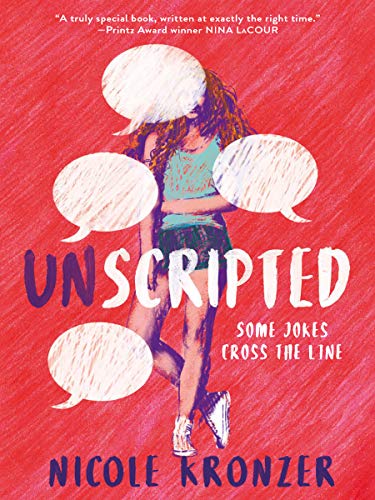“Unscripted’s” hero fights sexism at improv camp

Unscripted by Nicole Kronzer —or “Kronz,” as her real-life high school students call her—is about what happens when 17-year-old comedy lover Zelda first confronts the misogynistic side of her favorite art form.
Before you write this off as a niche book for improvisers or summer campers…like…don’t. Unscripted is a must-read for any person, regardless of age, race, gender, sense of humor, etc. etc. etc.— but it’s particularly important for younger audiences. In fact, I wish I’d read it when I was Zelda’s age. Fortunately, “Kronz” makes it easy to catch up. Unscripted is one of those books you pick up in the morning, intending to read just a few pages before taking a shower and starting the day, but then, whoops—5 p.m. rolls around and you’ve finished it and are dreaming about it and realizing how much you can relate to the plot line and maybe calling your therapist to talk that out.
I was fortunate enough to talk to Nicole Kronzer herself. We talked first about her experience with both the comedy and literary worlds (which is part of what helps make this story so compelling). After college, Kronzer acted with a sketch comedy group in Minneapolis. However, the experience was brutal, she says—long, tiresome, thankless hours on stage. So, she went back to school to be an English teacher. “There’s so much improv that comes up with teaching writing, and vice versa,” says Kronzer. “Improv rules, can be writing rules, too. And trusting your partners in a scene is like trusting your characters in writing.”
She also spoke about the self-doubt that comes up in both spaces, but in different ways. “As an actor/improviser, you know immediately if what you said hit,” she says. “When you write, you write alone and forever and wait for feedback. In the absence of feedback, there is so much doubt.”
Kronzer’s work as a teacher also informs Unscripted in many ways. “One of the things that’s so great about being a teacher is that you get to know lots of students really intimately,” she says. In order to accurately and respectfully write these characters, Kronzer spoke to her students who could relate to any of these situations, and have them beta-read the stories, correcting any parts that seemed unrealistic or digging deeper where necessary. “Ben was the hardest character to write,” says Kronzer, referring to the main antagonist, a camp counselor who continually makes Zelda’s life hell. In order to create believable, fleshed-out characters, Kronzer explains, a writer must put themselves in the shoes of all of their characters, and sympathize with them. However, it is complex to try to relate to or sympathize with, in this case, one bad dude. Nicole says she had to write a character who, in spite of his abusive nature, is still redeemable. “Ben didn’t set out to do the wrong thing,” she says. “He believes that he deserves what he wants, and it is not his intention to mess up her life.”
Improv, definitely, is not written down, or planned ahead of time. When I asked Nicole how she went about writing improv scenes (as performed by the campers), she said, “I tried to find the line between being funny enough that it’s funny, but not so funny that you wouldn’t believe the 17-year-old would come up with it.” And really, it wasn’t about how funny the improv in the book was to the reader: “You’re not thinking about improv content, you’re thinking about the reactions to it.” In the novel, as Zelda is trying her best to make light of a terrible situation, she is forced not to think about what she wants—comedy—and instead feel the internalized pressure to represent, and fight for, all of womankind.
In the words of Kronzer, “We breathe in the patriarchy, you can’t help but be affected by it. The danger of improv is that the things that come off the top of your head can often be stereotypes.” A lot of the comedy the males in this story do follow this to a T. If a person is fat, they make fat jokes. If a person isn’t white, they make “jokes” about their race in terms of stereotypes. Though it is tempting to write them off as terrible people, their humor is really the symptom of a much larger problem. After all, the people making the mean-spirited jokes learned them from those before. Unscripted un-teaches this, stating without a doubt or hesitation that some things just aren’t funny. Zelda feels that if she can take down the individual people in her way, she will be winning a battle for all of womankind. But she has to learn that she cannot do it alone, she needs an army.
In my experience of reading this book as well as talking to Kronzer, I realize that I, at 22 years old, know nothing about the way children are being reared today. In public school in South Carolina, I was taught about heterosexual sex, separately from the boys. I was told that abstinence was the way, drugs would kill me, and the world was a dangerous place—the less I knew about it, the better. Of her experience raising children, Kronzer told me: “Over the pandemic we watched all of the shows I’ve loved. My nine-year-old probably shouldn’t watch Schitt’s Creek…but those shows give us an opportunity to talk about difficult topics and establish an ‘ask me anything’ atmosphere. Perhaps subconsciously, she has done the same with Unscripted. The book takes on difficult topics like sexism, racism, and abuse. So in a way, with Zelda and her army, her students and her readers, Kronzer is also leading a battle for comedy womankind.
Check out ‘Unscripted’ in our bookshop!
